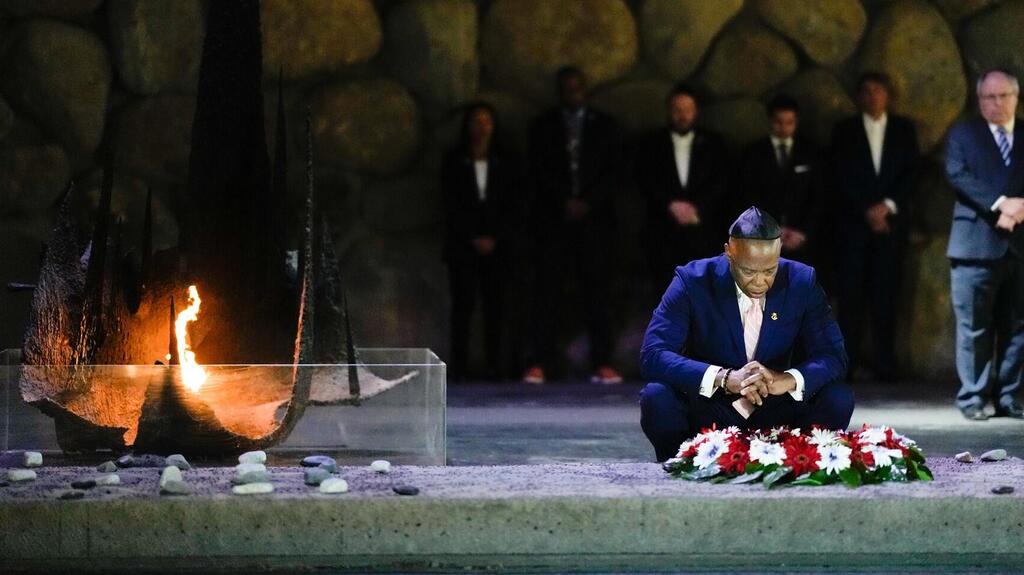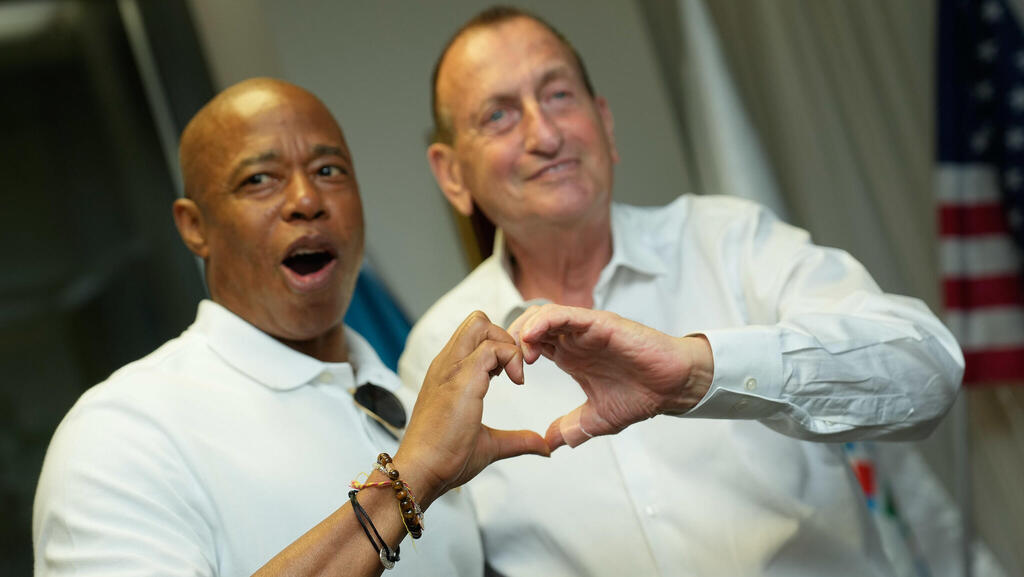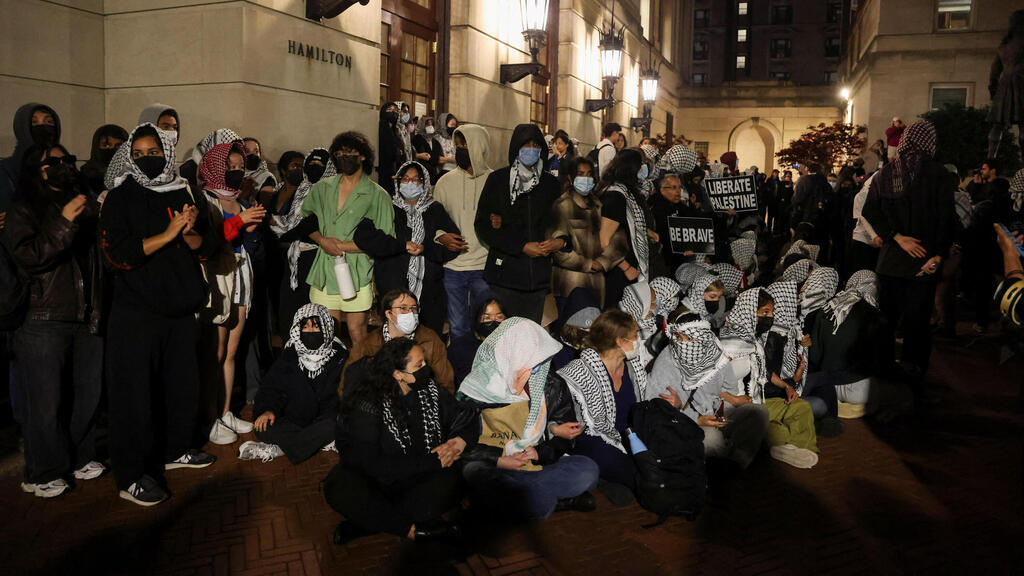New York City Mayor Eric Adams has no doubt what started the recent wave of anti-Israel protests on college campuses, that broke out on his home turf. "Columbia has a history of protest, and the country. We have a history of protest for many years," he said. "What I believe happened here is that we had a great influence or influence of outside agitators," the mayor said in an interview with Ynet.
"48% of the people we arrested during the CUNY and Columbia protests did not have any affiliation of being either student or faculty member. That's that is troubling to learn," Adams said adding people came in to push their agenda on to the students. "I think there's an effort to radicalize our students. And we must be vigilant to ensure that does not happen."
Politicians from your party came to support the protesters. Alexandria Ocasio Cortez entered the campus.
"I call out anyone that supports the destruction of property, I'd call out anyone that is not standing firm on have the right to have a peaceful protest or peaceful call for change. Anyone who is not supportive, that is in contrast to what we believe are the fundamental and foundational rights of this country."
Adams said he too participated in protests in the past.
"I don't think anyone or any countries hold protests as a fundamental right, in this part of our society of more than Israel in America. I have witnessed protests, peaceful protests in Israel, and we have witnessed peaceful protests in America. I have protested as a young person, so I know the importance of protest."
"What we're seeing now is not merely protest, when you have young people calling themselves Hamas and celebrating Hamas. When you see the destruction of property when you see training courses on how to do destructive things, and pamphlets and propaganda that call for the death of Israel and the death of America… that is the type of hate speech that may not be illegal but is immoral. And when people break the laws such as burglary or destruction of property, that is breaking the law, and we about respond accordingly."
Columbia U. riots
You mention training. Members of your city council transferred funds to organizations now supporting the student protests. Will you investigate it?
They don't come from the mayor's office. They come from the city council. And we do not have any authority over how the city council uses their discretionary dollars. So it's the role of the Comptroller and the role of the leader of the city council. Yes, it would be my stance, if these dollars are going to organizations connected to any criminal organization."
Adams often speaks of being arrested at age 15 with his brother, and badly beaten by the city police, an experience that prompted him to join the force and work to correct its ways. He served for 22 years in the police and after retiring, established an organization to fight police brutality.
Was the handling of the police in this case to your satisfaction, including, for example, the incident with the shooting of the police officer?
"The police responded to a very complicated and challenging series of events that took place on Columbia ground when you had an encampment and you had a building that was where police did not know what was inside that building with the students. At the same time, you had another college a short distance away, where there were violent protesters throwing everything from bottles at police, to other objects. And with all of that, the police responded appropriately. They executed a well-thought-out plan that minimized any injuries to students and police officers."
"Unfortunately, as in operations like that, there was an accident that was not part of the enforcement action. An officer was in a different area while bolstering his weapon, and accidentally pulled the trigger. No one was injured. No student was in danger."
3 View gallery


NYC mayor Eric Adams at Yad Vashem
(Photo: Michael Appleton/Mayoral Photography Office)
The interview with Mayor Adams took place hours after the ADL released its latest data on the surge of antisemitism around the world and specifically in New York. He agreed that during his term, there had been a rise in antisemitic incidents.
"Yes, antisemitism has been on the increase. As I indicated, there has been more graffiti and words but not assaults, which is very important," he said. We're going to protect the Jewish people of the city and we're going to protect all our groups in the city. Because we cannot allow one group or any group to be the victim of hate. There's no room for hate in our city."
It is hard to doubt the mayor's sincerity in his expressed feelings for Israel. When I asked if despite what was going on, he planned to spend his retirement years on the Golan Heights, as he had once said, his tone changed, and his eyes lit up.
"I find that region to be a beautiful region and I think the energy there is strong, and I believe there's an opportunity to find peace, that everyone can live in peace," he said adding that the war must end, the hostages returned and Hamas defeated.
What is the strong stance towards Israel? Where does it really come from? Some people will say you're the biggest supporter in the history of New York mayors.
"Well, I did not come into City Hall without a lack of understanding of how long the relationship was with the Jewish community and the African American community. Our struggles have been intertwined from the days of the civil rights battle. There's a real deep relationship for many years that I was very much aware of and that continued in my political years. I always receive strong support from many communities in general, but specifically from the Jewish community. And so, there's always been a deep relationship."
New York and Tel Aviv share a high cost of living. It was New York that removed Tel Aviv from the top of the most expensive cities list.
"Well, I think the cost of living has gone up, and really at the heart of that, is how much it costs to rent or to buy a home. And how we combat that is to increase our inventory. We have an inventory problem in the city, a 1.4% vacancy rate, and for affordable units is almost functionally zero. So our goal is to build more housing and to make sure we build affordable housing, using government subsidies so that we can bring down what is probably the largest expense that individuals have," he said.
3 View gallery


NYC mayor Eric Adams with Tel Aviv mayor Ron Huldai
(Photo: Michael Appleton/Mayoral Photography Office)
What is the secret? Why is New York still the greatest city in the world?
"It goes to the foundation of what we were talking about. We are the greatest city because of our diversity. When you have great minds who come here with the bright light of enthusiasm, or to be part of the American dream."
"We inherited the city, where there was a 40% increase in crime, where we were not having Jobs returned to our city fast enough. "No one wanted to go now subway system," he said. "Only two years later, we have more jobs than ever in the history of the city. We're outpacing our state in children's reading and math. We have built more houses in one year than in the history of the city. More people who were formerly homeless, now moved into permanent housing, more than in the history of the city. We've decreased gun violence homicides and the major crimes in our city. People are back on the subway system, tourism is back in our city."





